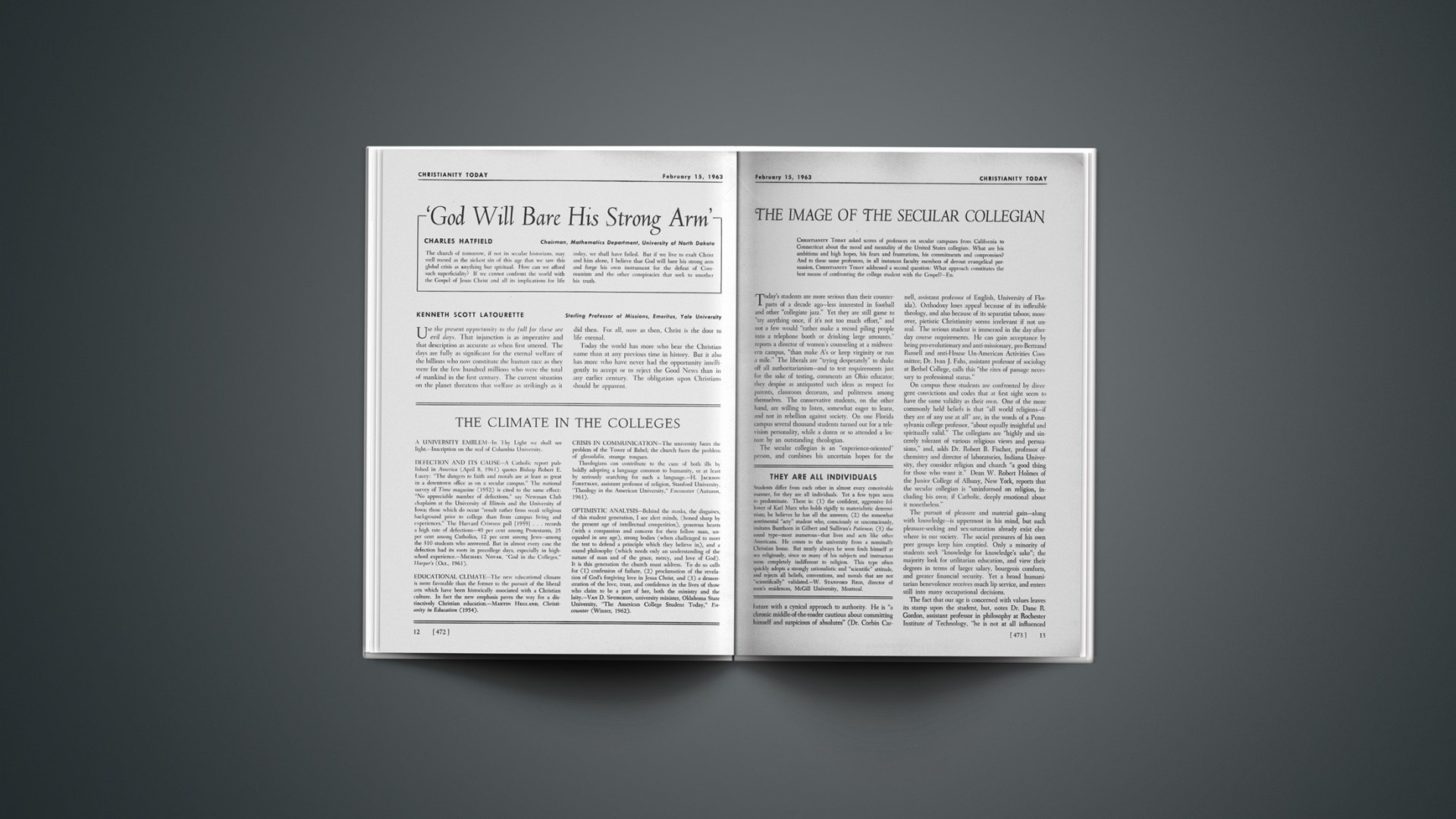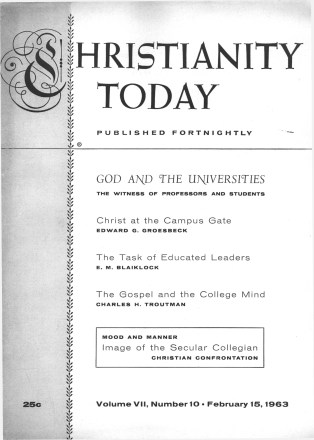CHRISTIANITY TODAY asked scores of professors on secular campuses from California to Connecticut about the mood and mentality of the United States collegian: What are his ambitions and high hopes, his fears and frustrations, his commitments and conpromises? And to these same professors, in all instances faculty members of devout evangelical persuasion, CHRISTIANITY TODAY addressed a second question: What approach constitutes the best means of confronting the college student with the Gospel?—ED.
Today’s students are more serious than their counterparts of a decade ago—less interested in football and other “collegiate jazz.” Yet they are still game to “try anything once, if it’s not too much effort,” and not a few would “rather make a record piling people into a telephone booth or drinking large amounts,” reports a director of women’s counseling at a midwestern campus, “than make A’s or keep virginity or run a mile.” The liberals are “trying desperately” to shake off all authoritarianism—and to test requirements just for the sake of testing, comments an Ohio educator; they despise as antiquated such ideas as respect for parents, classroom decorum, and politeness among themselves. The conservative students, on the other hand, are willing to listen, somewhat eager to learn, and not in rebellion against society. On one Florida campus several thousand students turned out for a television personality, while a dozen or so attended a lecture by an outstanding theologian.
THEY ARE ALL INDIVIDUALS
Students differ from each other in almost every conceivable manner, for they are all individuals. Yet a few types seem to predominate. There is: (1) the confident, aggressive follower of Karl Marx who holds rigidly to materialistic determinism; he believes he has all the answers; (2) the somewhat sentimental “arty” student who, consciously or unconsciously, imitates Bunthorn in Gilbert and Sullivan’s Patience; (3) the usual type—most numerous—that lives and acts like other Americans. He comes to the university from a nominally Christian home. But nearly always he soon finds himself at sea religiously, since so many of his subjects and instructors seem completely indifferent to religion. This type often quickly adopts a strongly rationalistic and “scientific” attitude, and rejects all beliefs, conventions, and morals that are not “scientifically” validated.—W. STANFORD REID, director of men’s residences, McGill University, Montreal.
The secular collegian is an “experience-oriented” person, and combines his uncertain hopes for the future with a cynical approach to authority. He is “a chronic middle-of-the-roader cautious about committing himself and suspicious of absolutes” (Dr. Corbin Carnell, assistant professor of English, University of Florida). Orthodoxy loses appeal because of its inflexible theology, and also because of its separatist taboos; moreover, pietistic Christianity seems irrelevant if not unreal. The serious student is immersed in the day-after-day course requirements. He can gain acceptance by being pro-evolutionary and anti-missionary, pro-Bertrand Russell and anti-House Un-American Activities Committee; Dr. Ivan J. Fahs, assistant professor of sociology at Bethel College, calls this “the rites of passage necessary to professional status.”
On campus these students are confronted by divergent convictions and codes that at first sight seem to have the same validity as their own. One of the more commonly held beliefs is that “all world religions—if they are of any use at all” are, in the words of a Pennsylvania college professor, “about equally insightful and spiritually valid.” The collegians are “highly and sincerely tolerant of various religious views and persuasions,” and, adds Dr. Robert B. Fischer, professor of chemistry and director of laboratories, Indiana University, they consider religion and church “a good thing for those who want it.” Dean W. Robert Holmes of the Junior College of Albany, New York, reports that the secular collegian is “uninformed on religion, including his own; if Catholic, deeply emotional about it nonetheless.”
The pursuit of pleasure and material gain—along with knowledge—is uppermost in his mind, but such pleasure-seeking and sex-saturation already exist elsewhere in our society. The social pressures of his own peer groups keep him emptied. Only a minority of students seek “knowledge for knowledge’s sake”; the majority look for utilitarian education, and view their degrees in terms of larger salary, bourgeois comforts, and greater financial security. Yet a broad humanitarian benevolence receives much lip service, and enters still into many occupational decisions.
The fact that our age is concerned with values leaves its stamp upon the student, but, notes Dr. Dane R. Gordon, assistant professor in philosophy at Rochester Institute of Technology, “he is not at all influenced or attracted toward religious activities.” He has little or no interest in Christianity, although he is more disinterested than antagonistic. He has broken with formal religion and has only vague and confused impressions of the Christian religion—observe the Golden Rule and all will be well (Dr. C. T. Youngberg, professor of soils, Oregon State University). “Many of the less thoughtful,” adds a Florida professor, “easily abandon a faith that has been equated with moralism, or continue with a loose ‘Christianity of culture.’ ” They consider Christianity to be “little more than an agency of social good works and a medium of psychological uplift and are, in fact, quite illiterate of the claims and content of historic Christianity” (Dr. Robert B. Fischer, Indiana University). “Usually their thinking is hazy concerning true Christianity,” an Indiana professor notes, “not only because of misinformation, but also due to muddled explanations or sermons with an overemphasis on minor points.” They have been confused further by neoorthodoxy, which has preempted orthodox vocabulary while destroying the older beliefs (Dr. Robert M. Davies, chairman of the Division of the Humanities, Thiel College). The “typical collegian,” thinks Dr. Virginia Lowell Grabill, director of women’s counseling at Evansville College, Evansville, Indiana, “believes Christianity concerns ‘being good,’ which to him means having a good reputation (even though he loudly declares he will live his own life and doesn’t care what people think). He reports illegalities only when he himself is affected; he thinks it cute to flout the law. He does not believe in a standard of morality.” His concept of knowledge, suggests Dr. Calvin Huber, assistant professor of chemistry at University of Wisconsin-Milwaukee, is so influenced by recent scientific technology that all knowledge is assumed to be objective (outside the self and perceivable by self-effort only), and the Gospel is easily assumed to be subject to rejection on the authority of self-decision.
Although preparing for “life in a corporation-oriented society,” he looks beyond mere conformity and is searching for “something that will make life meaningful” (Dr. Joseph E. Grimes, Summer Institute of Linguistics, Wycliffe Bible Translators). Dr. A. Gilbert Cook, assistant professor of chemistry at Valparaiso University, finds him “usually an agnostic with an open mind.” Yet he gives the appearance of wishing to be “intellectually perceptive, just in his social relationships, and broadly tolerant on moral issues.” But “only a minority,” remarks an East Coast professor, are “interested in giving their attention to anything which demands commitment,” although the more thoughtful are open to “a hearing for Christian theology.” Alongside the willingness to discuss religion, reports a midwestern professor, exists an attitude of skepticism toward any deep religious experience.
The reflective student who is aware of the limitations of the scientific method, particularly in respect to moral and religious questions, will probably “test the warmhearted Christian” to discover whether a believer can also be a “hardheaded scientist,” and whether Christians know where the scientific method fits and where it doesn’t. He will expect Christians—thinks sociologist Ivan Fahs of Bethel College—to be fluent with the secular community’s “scientific language,” including such terms as “independent and dependent variables, units of analyses, correlation, probabilities, causation, a priori considerations, ex post facto judgments, ad hoc decisions,” and similar jargon, while he himself despises “the fundamentalist’s language.” But the secular collegian really wants “personal involvement” with others, despite a surface mien of brusqueness and unfriendliness. “He will respond to personal friendship,” adds Professor Fahs, “on a personal level over a glass of beer—and for the evangelical Christian this is the end of what could be a beautiful friendship.” Yet the dean of a New York college adds that some students are “idealistic and interested if challenged.” The university student is “willing to discuss Christianity—and sometimes is eager to do so—as a philosophy of life,” reports a professor in the Pacific Northwest. “In moments of thoughtfulness—when he cannot drown the mood in beer—he knows that having enough to eat and two cars is not enough, that he is more important than merely a tool to build material security,” comments Professor Grabill, and that is where Christianity can challenge him. His thinking is “geared to the future,” remarks Professor Cook, and “a discussion of purposes and goals in life immediately draws his interest.” He knows there was a day when men had a religion expressive of their faith and not of their doubts, and he wants a firm place to stand when all the world seems in motion.
END
“I found Christ as a freshman forty years ago. To my Christian faith I owe the major joys of life, a philosophy, a code, a confidence, and insights which would otherwise elude me. Youth in this stormy age need such blessings. I find no more urgent task than the endeavor to tell them so in language they understand, avoiding none of their problems, and giving a reason for faith in forms that reason will accept.”—Dr. E. M. Blaiklock, professor of classics, University of Auckland.










